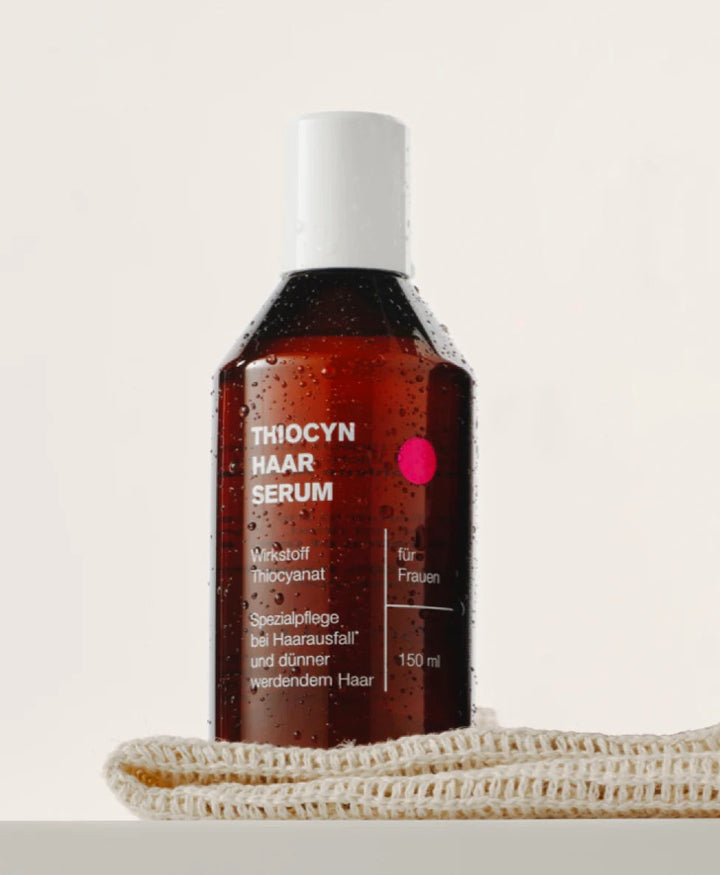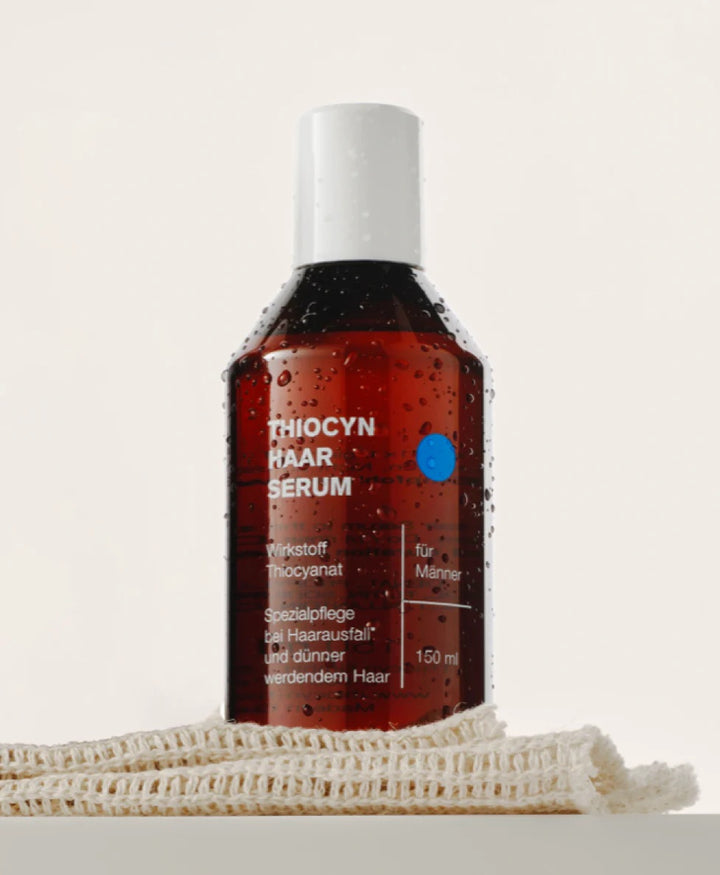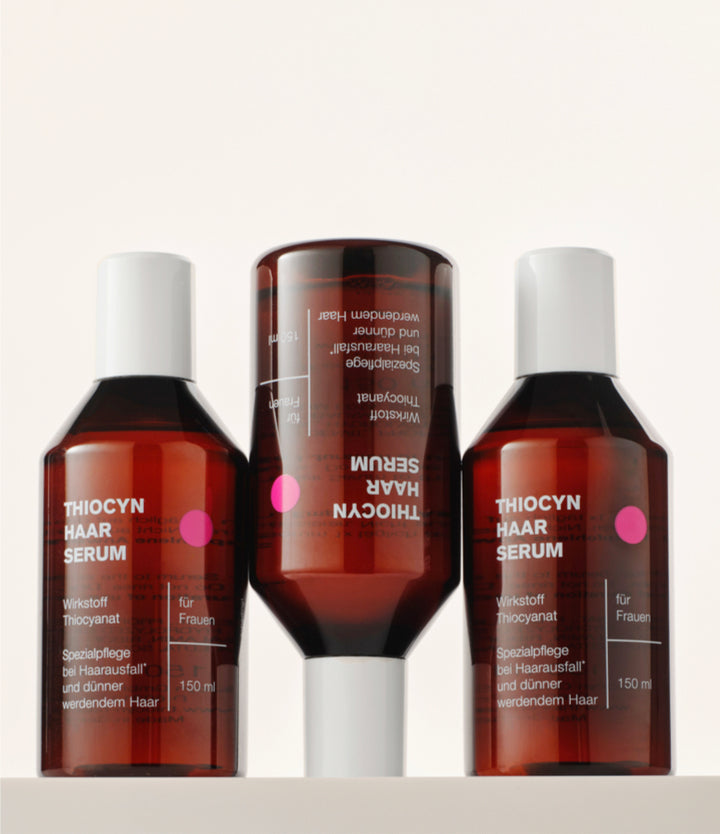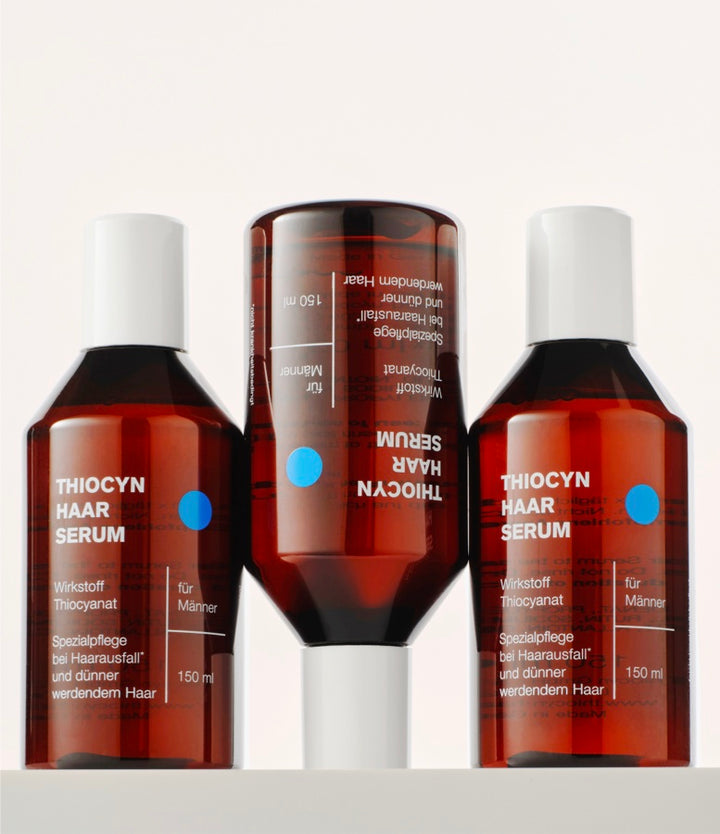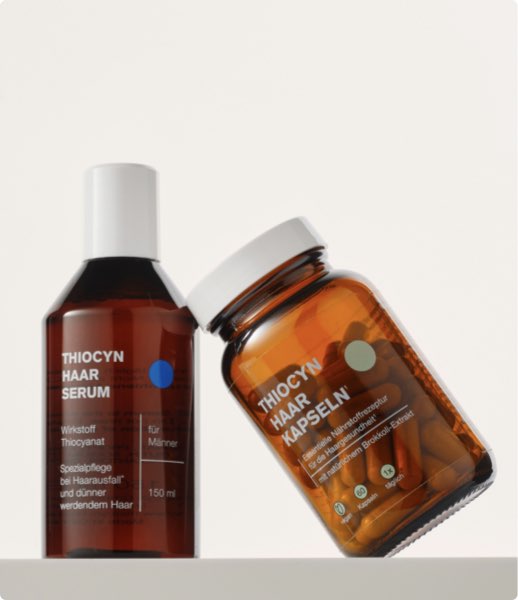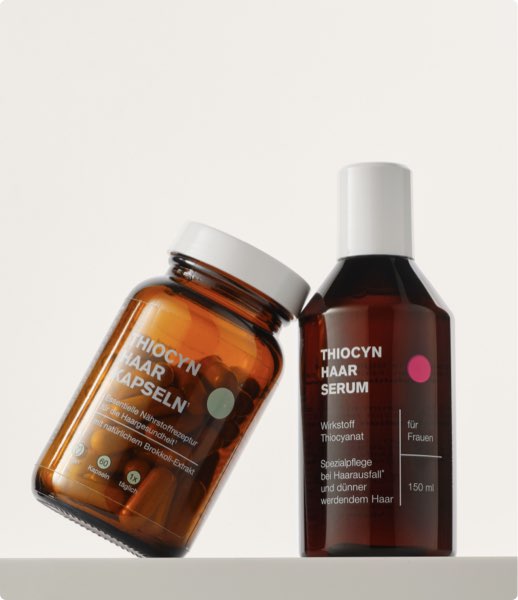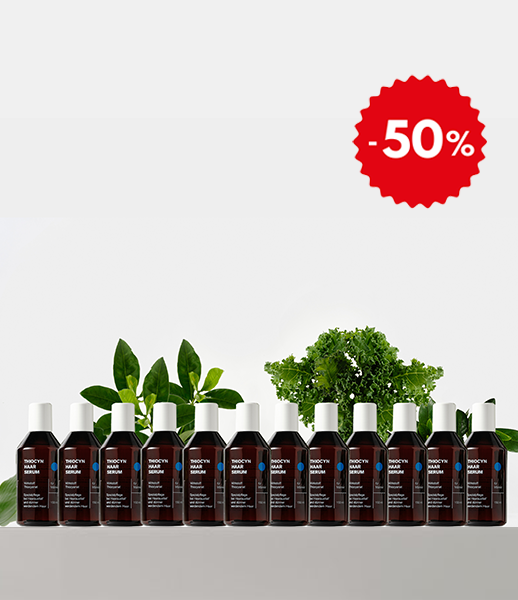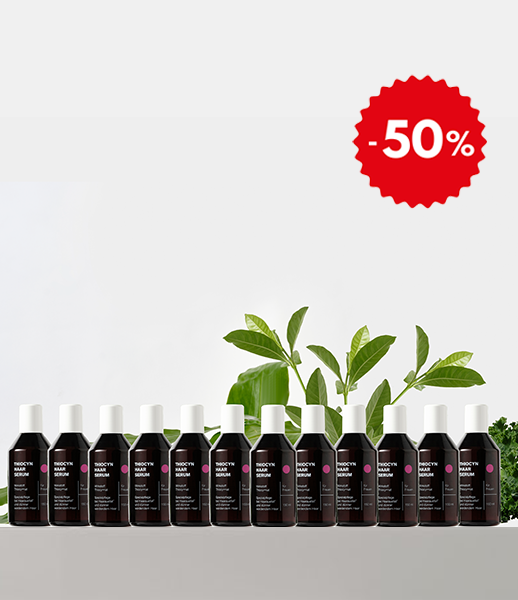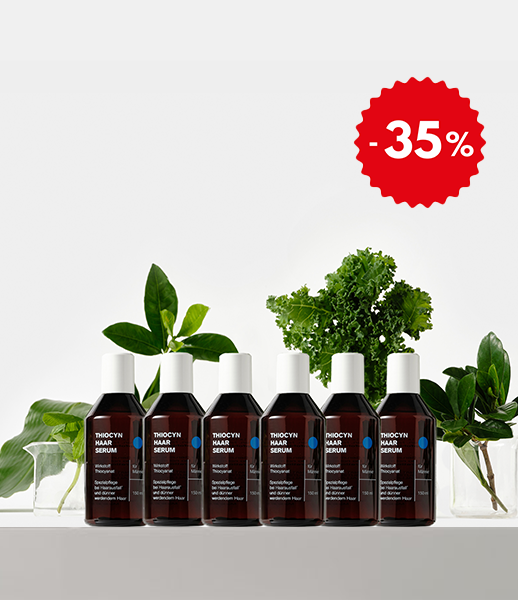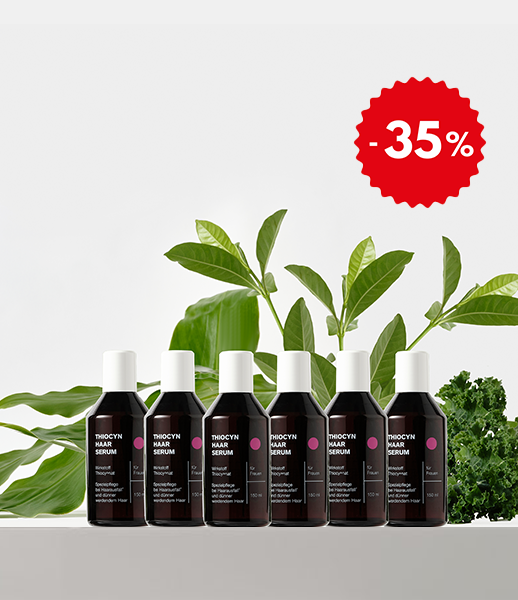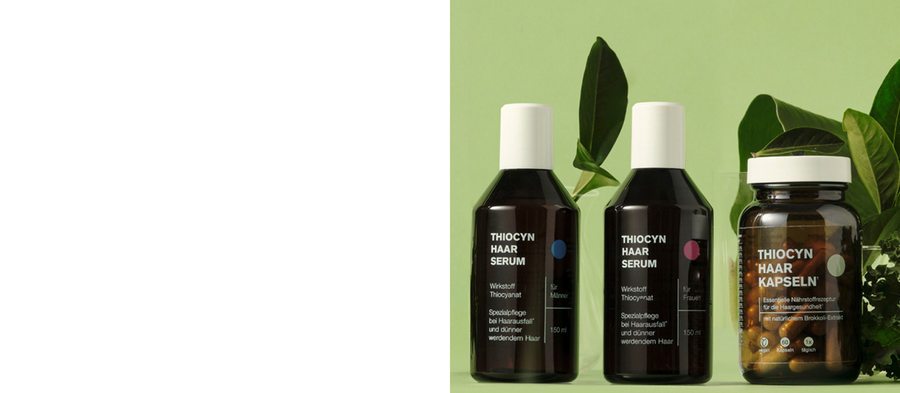| 04. July 2023
Vitamins for hair, a good idea

A good idea
- Vitamins are important functional substances of the cell metabolism at the hair root.
- Without vitamins, hair follicles have difficulty growing hair.
- We regularly absorb vitamins through our food.
- Not a vitamin, but a functional substance essential for healthy hair growth: thiocyanate.
For hair to grow, the hair follicles need sufficient nutrients: proteins in the form of amino acids for hair growth. Glucose as an energy source for cellular metabolism at the hair root. And vitamins to regulate the utilization of carbohydrates, proteins, and minerals. Vitamins also regulate the supply of the energy needed for this. Vitamins for hair are therefore important functional substances for healthy hair growth – just like thiocyanate.
Vitamins for hair: these are the most important ones
Vitamins are crucial for many metabolic processes. A lack of vitamins can lead to fatigue, headaches, or inflammation. Without certain vitamins, hair follicles struggle to maintain cell division and growth, not least in producing strong hair. And the likelihood of hair loss increases. Since our bodies cannot produce vitamins themselves, we must obtain them through our daily diet. Some examples:
Vitamin C
The best-known vitamin is certainly vitamin C. Its antioxidant properties are well known. Vitamin C is also essential for collagen biosynthesis. Collagen, in turn, is the most important structural protein of the skin, including the scalp, where the hair follicles are located. Collagen helps the skin retain moisture. A healthy scalp with good circulation is one of the key prerequisites for continuous hair growth and healthy hair . Classic sources of vitamin C are citrus fruits such as oranges, as well as vegetables such as cabbage and peppers, and especially sea buckthorn.
Vitamin B7
Vitamin B7 , or biotin, plays an important role in protein metabolism for the production of hair keratin and supports glucose production to supply hair follicles with energy for hair production. Brittle hair is a typical symptom of biotin deficiency, but is unlikely to occur because biotin is found in many foods, such as baker's yeast, egg yolk, soy, oatmeal, walnuts, mushrooms, fish, spinach, and bananas. Adults who eat a balanced diet can easily meet their biotin needs through their daily diet.
Vitamin E
Vitamin E promotes the formation of blood vessels in the hair follicles and thus the supply of nutrients to the hair roots. Sources of vitamin E are vegetable oils. Butter, nuts, and seeds also contain vitamin E in smaller amounts.
Vitamin F
All essential fatty acids are collectively known as vitamin F. Vitamin F is important for the metabolism of mitochondria, the powerhouses of the cell. A lack of vitamin F has negative effects on cellular energy supply. In addition to enzymatic changes in the scalp, diffuse hair loss can also occur.
Vitamin D
Vitamin D is partly responsible for cell division in the hair roots. It is the only vitamin whose supply is not primarily obtained through diet. The body produces vitamin D itself with the help of sunlight. A deficiency in vitamin D or sunlight also leads to impaired hair formation. From the age of 70, the skin's ability to synthesize vitamin D is reduced to such an extent that premature hair loss can occur.
Minerals and hair growth
If the organism lacks mineral trace elements such as iron or zinc, this also leads to disruptions in cell metabolism at the hair root.
Too little oxygen binding iron In the blood, the body typically reacts with an increase in heart rate, so that blood circulates faster in the bloodstream. Symptoms of iron deficiency include fatigue, shortness of breath, and headaches. If the body lacks oxygen, cell division at the hair root also stalls. The hair transitions from the growth phase to the resting phase earlier. Hair cycle shortens, the hair falls out.
Hair also needs Zinc , because it is essential for the growth and renewal of hair cells. Without zinc, hair cells cannot divide quickly enough. Since the body cannot store zinc, it needs constant replenishment. Animal foods contain significantly more zinc than plant-based foods. The body has a harder time absorbing zinc from fruits and vegetables. Fish and red meat are good sources of zinc.
As valuable as vitamins: Thiocyanate
Due to its vitamin-like effects, one can Thiocyanate It can be classified as a vitaminoid. Unlike vitamins, it can be produced by the body itself to a certain extent. Three enzymes are available for this purpose.
The structure of the thiocyanate molecule is SCN = sulfur, carbon, nitrogen – making it so simple that thiocyanate was more or less ignored by biology for a long time. Thiocyanate is, however, a multi-talented substance: In the human body, it has an anti-inflammatory and cell-stabilizing effect on cells by neutralizing oxygen radicals. It actively promotes cell formation and stimulates the hair roots to produce new hair.
About two-thirds of the thiocyanate present in the body is produced by the body itself. Two enzymes are responsible for this; liver cells, in particular, produce thiocyanate. A good third of the thiocyanate is absorbed through the diet, particularly through dairy products and vegetarian foods, especially brassicas such as broccoli, but also cashew nuts.
Thanks to modern hygiene standards, valuable thiocyanate is regularly washed out of the hair and scalp. If the hair follicles lack thiocyanate, it can be supplemented externally. The patented thiocyanate formula in Thiocyn Hair Serum strengthens the hair roots and protects them against growth-disrupting influences. Applied once daily, Thiocyn Hair Serum can halt hair loss* and stimulate hair growth.
Detect vitamin deficiency
Vitamins influence both the quality and growth duration of hair. If hair follicles lack nutrients, energy, or vitamins, hair growth is typically slower. Or the growth phase of the hair cycle is interrupted prematurely, resulting in hair loss.
Hair loss due to vitamin deficiency is rather unlikely given the food supply in Germany, but it is still a possibility in cases of an unbalanced diet, absorption disorders, pregnancy or certain illnesses.
Doctors distinguish between mild vitamin deficiency (hypovitaminosis) and severe vitamin deficiency (avitaminosis). A blood test at the doctor's office can determine individual vitamin levels and confirm a vitamin deficiency.
READ BY 23,000 PEOPLE
Join 23,000 others and find out how to improve your hair health with great offers and discounts as well as helpful advice
